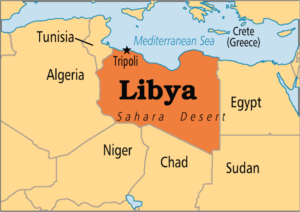AUGUST 14- TODAY’S READING FROM THE ONE YEAR BIBLE- NEHEMIAH 7:61-9:21; 1 CORINTHIANS 9:1-18; PSALM 33:12-22; PROVERBS 21:11-12
TODAY’S READING FROM THE OLD TESTAMENT- NEHEMIAH 7:61-9:21
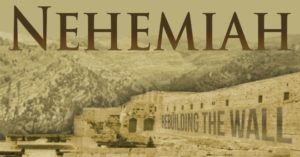 In earlier chapters in the Book of Nehemiah (Chapters 1-6), we saw how 41 teams of fellow-pilgrims under Nehemiah’s direction were working in clusters, repairing the various parts of the wall of Jerusalem. They did it in just 52 days. Even their enemies, who worked so hard to prevent their success, realized that this work had to have been accomplished with the help of their God (Nehemiah 6:15-16).
In earlier chapters in the Book of Nehemiah (Chapters 1-6), we saw how 41 teams of fellow-pilgrims under Nehemiah’s direction were working in clusters, repairing the various parts of the wall of Jerusalem. They did it in just 52 days. Even their enemies, who worked so hard to prevent their success, realized that this work had to have been accomplished with the help of their God (Nehemiah 6:15-16).
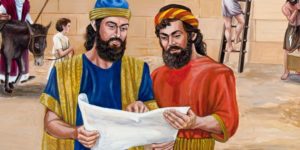 After the wall project was completed, there was a need to organize the people. Gatekeepers, singers, and Levites were appointed to provide security and spiritual and civil organization. The genealogical records were checked to see if people were registered as legitimate citizens of this new Jerusalem.
After the wall project was completed, there was a need to organize the people. Gatekeepers, singers, and Levites were appointed to provide security and spiritual and civil organization. The genealogical records were checked to see if people were registered as legitimate citizens of this new Jerusalem.
As our reading begins, we see that some did not have their name written in the book of records (7:61-65). They could not show that their families had descended from Israel.
These were excluded from the priesthood as unclean and would remain so until their citizenship by ancestry could be proved.
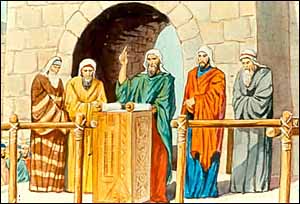 Nehemiah also recorded what the heads of families contributed to the work.
Nehemiah also recorded what the heads of families contributed to the work.
Chapter 8 records a great assembly when once again the people gather ‘as one man’ on the first day of the 7th month (Numbers 29:1; Feast of Trumpets, Rosh Hashanah), indicating their unity of purpose. They gathered on October 8, 444 BC. to hear God’s Word. Ezra brings out the Law and reads it aloud from daybreak till noon.
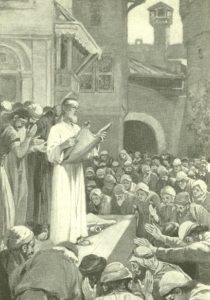 Ezra read the Torah from a high wooden platform constructed for the occasion. This is the origin of pulpit preaching. People honored the Lord by honoring His Word. They stood as the Word of God was read to them. They put themselves symbolically ‘under the Word’. They listened with the intent to obey. The people responded by lifting their hands (8:6), saying ‘Amen!’, then bowing down and worshiping the Lord with their faces to the ground.
Ezra read the Torah from a high wooden platform constructed for the occasion. This is the origin of pulpit preaching. People honored the Lord by honoring His Word. They stood as the Word of God was read to them. They put themselves symbolically ‘under the Word’. They listened with the intent to obey. The people responded by lifting their hands (8:6), saying ‘Amen!’, then bowing down and worshiping the Lord with their faces to the ground.
While they were gathered there, certain instructors helped to interpret to each group the application to the Word.
Nehemiah 8:8 8 They read from the book, from the law of God, translating to give the sense so that they understood the reading.
The Law was written in Hebrew, and the people spoke Aramaic, so it was important for the people to have the Word interpreted into the language of their hearts.
Once we hear the Word of God expounded, it is helpful to meet with our families, our brothers, and sisters in small groups to discuss the meaning of what we have just heard and see how it applies to our daily living and current situations.
 Nehemiah, Ezra, and the Levites helped the people see that the Law that demands righteousness also contains the promise of God’s gift of righteousness through One who would be ‘the joy of YAHWEH.’
Nehemiah, Ezra, and the Levites helped the people see that the Law that demands righteousness also contains the promise of God’s gift of righteousness through One who would be ‘the joy of YAHWEH.’
The joy of God the Father (Yahweh) is that which gives Him satisfaction, and that was the righteousness expressed in His law. The real joy of the LORD (Yahweh) is the Lord (Adonai) Jesus. To Him, the Father declared that He was well pleased. He rejoices over Him with singing and all those who are IN HIM!
Thus, the Law was their strength. The Person of Christ is our strength. The finished work of Christ is our strength. The Indwelling life of Christ through the Holy Spirit is our strength!
Only as we abide in Christ, who honors the Law with His joyful obedience, are we strengthened in our innermost being.
With this declaration in Nehemiah 8:10 the people went to their homes to eat, drink and send portions of food to others with great joy. Why?
Nehemiah 8:12b because they understood the words which had been made known to them.
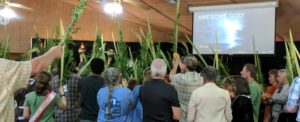 On the second day, the people realized that it was written in the Law, that they were to commemorate the Lord’s faithfulness to provide shelter for them in their wilderness wanderings by building booths with Hadassah branches (myrtle) and celebrating the Feast of Tabernacles (8:15). (According to Leviticus 23, it should have been from the 15th to the 22nd day of the seventh month).
On the second day, the people realized that it was written in the Law, that they were to commemorate the Lord’s faithfulness to provide shelter for them in their wilderness wanderings by building booths with Hadassah branches (myrtle) and celebrating the Feast of Tabernacles (8:15). (According to Leviticus 23, it should have been from the 15th to the 22nd day of the seventh month).
In Nehemiah 9:1 on the 24th day of the 7th month they confessed their sins in a solemn ceremony of repentance.
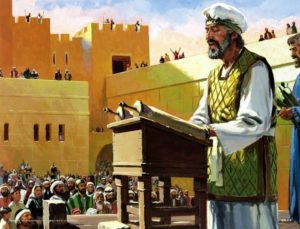 Nehemiah 9:6- 21 records the Levite’s prayer of worship in which they honor the Lord’s faithfulness towards them throughout history. Verses 6-15 all have “YOU” (that is the Lord) as subject in the sentence. From verse 17, “They” become the subject of the sentence, highlighting their history of unfaithfulness. ‘They’ became arrogant, stiff-necked, did not obey, refused to listen, failed to remember, appointed a leader to return them to Egypt.
Nehemiah 9:6- 21 records the Levite’s prayer of worship in which they honor the Lord’s faithfulness towards them throughout history. Verses 6-15 all have “YOU” (that is the Lord) as subject in the sentence. From verse 17, “They” become the subject of the sentence, highlighting their history of unfaithfulness. ‘They’ became arrogant, stiff-necked, did not obey, refused to listen, failed to remember, appointed a leader to return them to Egypt.
Despite their failure, God showed them mercy:
Nehemiah 9:17b-21. “But You are a God of forgiveness, Gracious and compassionate, Slow to anger and abounding in lovingkindness; and You did not forsake them. 18 Even when they made for themselves a calf of molten metal and said, ‘This is your God Who brought you up from Egypt,’ and committed great blasphemies, 19 You, in Your great compassion, did not forsake them in the wilderness; the pillar of cloud did not leave them by day, to guide them on their way, nor the pillar of fire by night, to light for them the way in which they were to go. 20 You gave Your good Spirit to instruct them, Your manna You did not withhold from their mouth, and You gave them water for their thirst. 21 Indeed, forty years You provided for them in the wilderness and they were not in want; Their clothes did not wear out, nor did their feet swell.”
(We will continue reading this remarkable prayer, the longest one recorded in the Bible, tomorrow.)
TODAY’S READING FROM THE NEW TESTAMENT – 1 CORINTHIANS 9:1-18
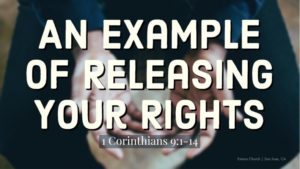 The Apostle Paul defends his apostleship to the church in Corinth. They have been seduced by false teachers and those who claimed to be ‘super apostles.’ These false apostles charged money for attendance at their meetings and prospered materially. They implied that Paul was not a bonafide apostle because he did not charge money and lived simply. Paul defends his position, saying that although the Scripture teaches that he and the other true apostles had a right to receive financial support from those for whom he labored (1 Cor 9:3-12), he chose not to receive funding from Corinth. (He was receiving support from other churches at the time; 2 Corinthians 11:8). He chose to forego his right and offer his services free of charge, as it was important for it to be clear in the Corinthian situation, he was not beholden to any man.
The Apostle Paul defends his apostleship to the church in Corinth. They have been seduced by false teachers and those who claimed to be ‘super apostles.’ These false apostles charged money for attendance at their meetings and prospered materially. They implied that Paul was not a bonafide apostle because he did not charge money and lived simply. Paul defends his position, saying that although the Scripture teaches that he and the other true apostles had a right to receive financial support from those for whom he labored (1 Cor 9:3-12), he chose not to receive funding from Corinth. (He was receiving support from other churches at the time; 2 Corinthians 11:8). He chose to forego his right and offer his services free of charge, as it was important for it to be clear in the Corinthian situation, he was not beholden to any man.
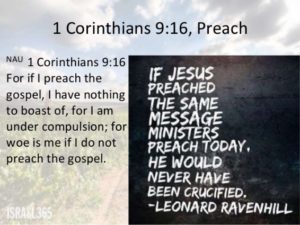 Paul defends the right that ministers of the gospel have to be supported financially in their work (1 Corinthians 9:14). But their motivation is not financial reward but the inner compulsion to extend God’s saving act to reconcile guilty sinners to Himself through Christ’s death on the cross.
Paul defends the right that ministers of the gospel have to be supported financially in their work (1 Corinthians 9:14). But their motivation is not financial reward but the inner compulsion to extend God’s saving act to reconcile guilty sinners to Himself through Christ’s death on the cross.
TODAY’S READING FROM THE BOOK OF PSALMS – PSALM 33:12-22
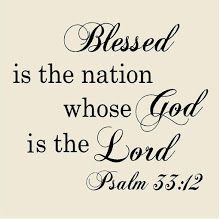 Psalm 33:12 12 Blessed is the nation whose God is the LORD, the people whom He has chosen for His own inheritance.
Psalm 33:12 12 Blessed is the nation whose God is the LORD, the people whom He has chosen for His own inheritance.
The Lord knows His creation and those who trust Him.
Have you trusted Him for your salvation? Do you believe His promises? Do you look for His coming?
Psalm 33:20-21 20 Our soul waits for the LORD; He is our help and our shield. 21 For our heart rejoices in Him, because we trust in His holy name.
Verse 22 is a suitable prayer for His church
Psalm 33:22 22 Let Your lovingkindness, O LORD, be upon us, according as we have hoped in You.
TODAY’S READING FROM THE BOOK OF PROVERBS- PROVERBS 21:11-12
Proverbs 21:11-12 11 When the scoffer is punished, the naive becomes wise; But when the wise is instructed, he receives knowledge. 12 The righteous one considers the house of the wicked, Turning the wicked to ruin.
This proverb reminds us that the righteous one observes what is right and wrong and must face the wrongdoer with the just consequence for his or her misdeeds.
We need more than discipline; we need instruction. We need examples, but we also need to rightly learn from them.
PRAY FOR THE NATIONS- LIBYA
The era of Qaddafi and sanctions is over. Potential for increased foreign investment and trade both exist. The post-Qaddafi government promised an open and democratic state that would be fair to all citizens. This has not happened. Dozens of independent, armed militia groups continue to cause trouble for many, including for Christians. Pray for a future of peace, stability, religious freedom, and most of all for a future of peace with God. Libya is less a whole country and more a group of fracture regions. Pray for the new government in Tripoli, may they bring peace and order to this fractured land.
Socialist People’s Libyan Arab Jamahiriya
Africa
Geography
Area: 1,775,500 sq. km
Mostly Saharan desert; only a coastal Mediterranean strip, 2% of its land area, is arable.
Population: 6,545,619 Annual Growth: 2.02%
Capital: Tripoli
Urbanites: 77.9%
HDI Rank: 55 of 182 (UN Human Development Reports 2009)
Peoples
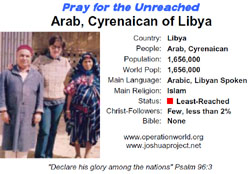 Peoples: 40 (70% unreached) All peoples
Peoples: 40 (70% unreached) All peoples
Unreached Peoples Prayer Card
Official language: Arabic Languages: 32 All languages
Religion
Largest Religion: Muslim
| Religion | Pop % | Ann Gr | |
| Christians | 172,804 | 2.64 | 2.8 |
| Evangelicals | 19,662 | 0.3 | 5.2 |
| Muslim | 6,350,560 | 97.02 |
Challenges for Prayer
Libyan believers are increasing in numbers and faith and enjoy surprising freedom as a Christian community, but they still face many obstacles to fellowship, including fear of infiltrators. Libyans remain off-limits for evangelism, and approaches to them are risky for all involved. Continued state surveillance and family/social pressures are strong disincentives. Pray for greater religious freedom so that more might hear the gospel and be able to follow Jesus openly. Pray also for Libyan believers to stand firm in their faith and to find spiritually edifying relationships – including suitable marriage partners in a society where marriage is typically arranged with extended family.
Specific areas of ministry:
a) Radio and satellite television provide two of the very few ways to evangelize Libyans. Three different shortwave-radio stations broadcast programs to Libya: IBRA (over Radio Moscow), HCJB and Adventist World Radio, but only 4.5 hours/week are in Arabic. The widespread use of satellite dishes (in the majority of households) enablesSAT-7 and other Christian satellite-television broadcasts to reach into homes. Pray for creative and effective programs with the means to disciple responsive listeners and pray for protection for those who respond.
b) There is a great need for Bibles; there are far too few to go around. There are many materials in standard Arabic, but no Scriptures and almost no audio or video resources in Libyan Arabic. Pray that work on this may start so Libyans can read or hear the gospel in their heart language.
c) Access, though strictly censored in Libya, is becoming more available and open. Pray that Libyans may be drawn to Christian websites and attracted to the gospel. Many Christian-focused websites in Arabic are having a profound impact.
d) The visit of the OM ship built bridges between the global Christian community and Libya as well as provided much-needed books and literature for the Libyan public. Pray for further opportunities to connect Libya and her people to the wider Christian world.
PRAYER: Father, what a blessing it is to know that You hear us when we call out to You. We exalt Your Word and gladly put ourselves under its rule, trusting the fact that faithful are You who call us to obedience will also do it. You will perform according to Your Word. Your joy, that is, Your Son, the Lord Jesus, is our strength. His indwelling life in us is our capacity to obey. Enable us to do what is pleasing to You this day. In Jesus’ Name. Amen.

